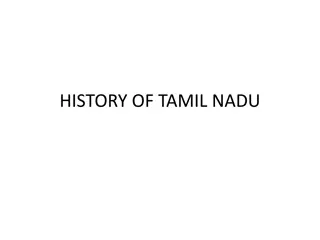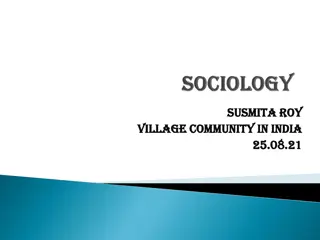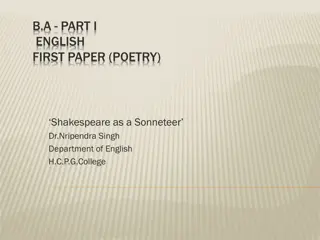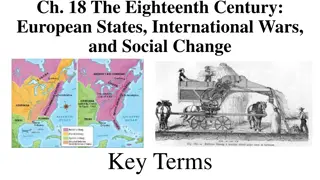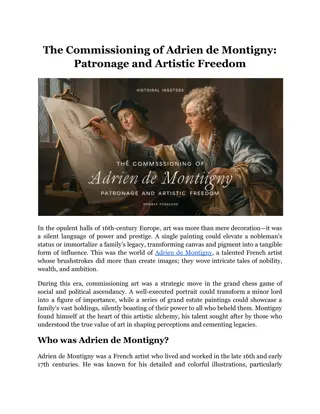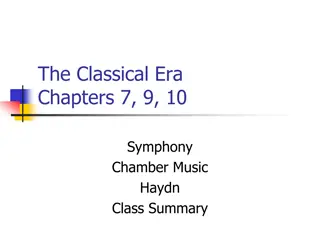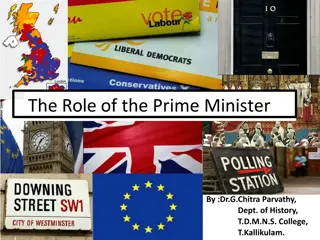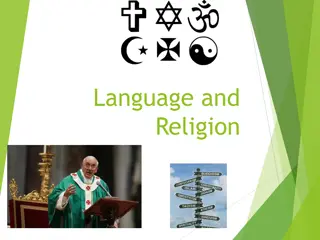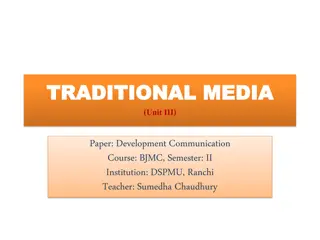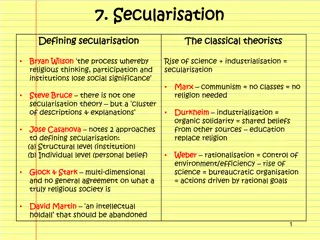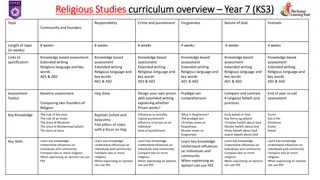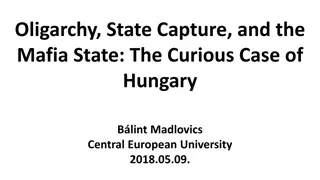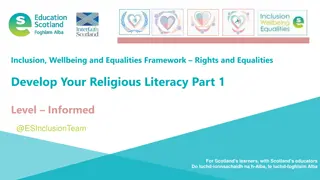Status of Family Laws in India: Hindu vs. Religious Minorities
The family and personal status laws in India vary between Hindu law and those pertaining to religious minorities. While Hindu law has seen extensive reforms, discriminatory provisions still exist. In contrast, laws governing religious minorities have undergone fewer reforms, leading to greater inequ
2 views • 4 slides
Creating Trustworthy Green Hotels Around Oceans
This paper examines the impact of green service attributes on consumer trust in sustainable green hotels around oceans. The study focuses on 12 certified green hotels in India and explores how Green Service Encounters influence consumer trust and re-patronage intention. The findings reveal that trus
7 views • 6 slides
The Pala Empire: Rise and Patronage of Buddhism
The Pala Empire, known for its significant expansion and patronage of Mahayana Buddhism, saw key rulers like Gopala, Dharmapala, and Devapala leading to a cultural flourishing with establishments like Vikramashila and Nalanda universities. Noted Buddhist scholars from this period include Atisha and
2 views • 15 slides
Understanding Bureaucracy: Origins, Functions, and Myths
Explore the concept of bureaucracy, tracing its origins and elements according to Max Weber's analysis. Discover the evolution from patronage to the merit-based system and debunk common bureaucratic myths prevalent in society. Gain insights into the role of civil servants and the intricate workings
4 views • 54 slides
Understanding Religious Conflict: Definition and Types Explored
Religious conflict is a complex and recurring concept throughout history. Scholars have defined it as disagreements between religious groups. This conflict arises from contentious issues touching on ideology, morality, power, and identity, influenced by various socio-political, economic, and cultura
1 views • 13 slides
Evolution of Akbar's Religious Policy: A Historical Overview
In the 16th century, Akbar the Great implemented a revolutionary religious policy in the Mughal Empire. Initially a devout Sunni Muslim, Akbar evolved his stance to promote harmony and equality among all religions, fostering tolerance and understanding. This shift marked a significant departure from
1 views • 25 slides
History of Tamil Nadu: The Sangam Age and Literary Sources
The history of Tamil Nadu during the Sangam Age is rich with literary excellence from the Tamil Sangam, where poets composed significant works. The three Sangams were pivotal in preserving Tamil literature under royal patronage, providing insight into the social, political, and economic conditions o
0 views • 15 slides
Socio-Cultural Features of Village Community in India
The traditional village community in India was historically self-sufficient, with its own production and consumption units. Over time, changes have led to increased interactions among villages, diminishing self-sufficiency. Factors like multi-caste populations, markets, pilgrimages, and pilgrimages
3 views • 18 slides
Emergence of Small Kingdoms in North India During 8th to 10th Century
The rise of small kingdoms in North India between 750 CE to 1000 CE was a result of the disintegration of empires, economic struggles, and weak administration. This period saw the emergence of powerful kingdoms like the Rastrakutas, Palas, and Pratiharas in different regions of India, each contribut
0 views • 28 slides
Elizabethan Religious Settlement: Unity Amidst Division
Amid religious division in England, Queen Elizabeth I implemented a Religious Settlement in 1559 to unify the country. The settlement, a blend of Protestant and Catholic elements, aimed to maintain peace and prevent rebellions. Elizabeth's strategic compromise pleased most people, though lingering t
0 views • 14 slides
Understanding Secularism: Principles and Advantages
Secularism is the principle of separating government institutions from religious entities to ensure equal rights for believers and non-believers. It safeguards freedom of religious belief and practice, upholds religious freedom, and promotes democracy and fairness. Secularism aims to prevent religio
0 views • 21 slides
Literature in the 16th Century: Styles, Patronage, and Poetry Traditions
Explore the concept of literature in the 16th century, focusing on rhetoric in the Renaissance, major styles in art, the role of courtiers and patrons, poetic traditions like heroic, Ovidian, pastoral, and sonnet, and delve into the analysis of Sir Thomas Wyatt the Elder's poem "The Long Love that i
0 views • 4 slides
Shakespeare's Sonnets: Treasures of Elizabethan Poetry
Shakespeare's sonnets, considered precious pearls of Elizabethan poetry, were written primarily in 1594 under the patronage of the Earl of Southampton. Divided into sections addressing a young man and a Dark Lady, they explore themes of love, beauty, and passion with a unique perspective. Despite be
0 views • 8 slides
Perceptions of Patron-Client Politics on Corruption in Papua New Guinea: A Research Proposal
Investigate the impact of patron-client politics on corruption in PNG to understand its effects on civil service and governance. Analyze traditional and modern systems to identify prevailing patronage types and their influence on corruption. The study aims to redefine corruption in the PNG context f
0 views • 24 slides
Transformation of South Wales Metro Phase 2
The South Wales Metro Phase 2 project aims to bring significant changes to the transportation system, including potential improvements to the bus network, reduced congestion, and benefits for both residents and businesses. It focuses on enhancing connectivity, increasing rail patronage, and promotin
0 views • 10 slides
Understanding Religious Language: Cognitivism vs. Non-Cognitivism in the University Debate
This discussion explores the debate between cognitivism and non-cognitivism in religious language. Cognitivism asserts that religious claims aim to describe the world and can be true or false, while non-cognitivism argues that such claims express attitudes and cannot be verified. Flew's challenge qu
0 views • 9 slides
European Enlightenment and Social Changes in the 18th Century
The 18th century witnessed significant changes in European states, marked by the emergence of natural laws, natural rights, and enlightened absolutism. Concepts such as patronage, balance of power, and primogeniture also played pivotal roles. The era saw the implementation of reason of state and the
0 views • 13 slides
Guide to Using the BSA Calendar of Religious Observances
The BSA Calendar of Religious Observances is a valuable resource for scheduling scouting events in consideration of various religious holidays and observances. This guide provides an overview of the calendar, highlights important dates, and emphasizes the importance of respecting religious diversity
0 views • 8 slides
The Commissioning of Adrien de Montigny: Patronage and Artistic Freedom
Explore how Adrien de Montigny's art flourished under patronage, balancing creativity and commissioned work.\n
1 views • 5 slides
Understanding Classical Era Symphony and Chamber Music
In the Classical Era, symphonies emerged as standalone works separate from operas, featuring a typical format of four movements with varying moods and tempos. Chamber music, enjoyed by players and listeners alike, particularly the string quartet, was popular. Haydn, with patronage from the Esterhazy
5 views • 7 slides
Understanding the Role of the Prime Minister in Government
Exploring the sources of a Prime Minister's power, constraints they face, and authority within the cabinet system. Topics include party support, royal prerogative, popular mandate, parliamentary leadership, patronage, powers, and constraints within the cabinet.
0 views • 11 slides
Understanding the Role of Language in Religion
Exploring the significance of language in religious contexts, this content discusses the functions, features, lexicon, grammar, and metaphorical aspects present in religious language. It delves into how religious language upholds spiritual beliefs, persuades believers, and expresses specific attitud
0 views • 8 slides
Understanding the Cultural Dimensions of Food and Religious Influences in Culinary Arts
Explore the impact of religious beliefs on food traditions and dietary restrictions across different cultures in the culinary world. Learn about the influence of major world religions on eating habits, food choices, and culinary practices. Discover how various religious groups, such as Christians, o
0 views • 26 slides
Politics and Corruption in the Gilded Age
The Gilded Age was marked by political machines, patronage, voter fraud, and a lack of antitrust enforcement. Presidents like Ulysses S. Grant were plagued by corruption scandals. The Republican Party was divided between Stalwarts and Half-Breeds, further complicating the political landscape. Leader
0 views • 23 slides
The Vital Role of Religious Institutions in Supporting Immigrants
Religions and immigration are interlinked in modern societies, where religions play a significant role in providing services, defending rights, and supporting the social cohesion of immigrants. Mainstream religious institutions serve as key actors in offering assistance, advocating for migrant right
2 views • 14 slides
Importance of Traditional Media in Rural India
Rural India is rich in diverse folk art forms that hold significant cultural value. Traditional media or folk media plays a crucial role in communication, offering familiarity, acceptance, and flexibility to convey messages effectively. Despite the lack of scholarly patronage, efforts are being made
0 views • 6 slides
Understanding Religious Language: Flew, Hare, Mitchell
Exploring the contrasting views of cognitivism and non-cognitivism in the context of religious language through the perspectives of Flew, Hare, and Mitchell. Delve into Flew's challenge on the undetectable gardener, Hare's concept of bliks, and Mitchell's response to the rationality of religious bel
0 views • 7 slides
Elite Patronage and Power Relations in Wales: Research Insights
Research project on elite positions of patronage in Wales, focusing on systems of patronage within civil society, access to elite roles in charities, and the reproduction of capital in civil society. Theoretical framework includes discussions on gender, education, and exclusionary practices in civil
0 views • 25 slides
Religious Accommodation in the Army: Advising Command
The content discusses the role of the Chaplain Corps in advising Soldiers and leaders on religious accommodation in the Army as of February 13, 2019. It covers learning objectives, legal foundations, Army policies, procedures, recent changes, and references related to religious accommodation. The in
0 views • 36 slides
Understanding Religious Discrimination Laws in California Workplace
Learn about the regulations and protections under FEHA and Title VII in California, including religious exemptions, accommodation requirements, case studies, and best practices to address discrimination issues effectively. Discover the statistical insights on religious discrimination complaints and
0 views • 45 slides
Understanding Secularisation: The Decline of Religious Influence in Society
Secularisation refers to the process in which religious thinking, participation, and institutions lose their social significance. This phenomenon is influenced by factors such as the rise of science, industrialisation, changing social attitudes, and the disengagement of the church from society. Evid
0 views • 8 slides
Philosophers' Views on Religious Experience: Insights and Critiques
This lesson delves into the perspectives of various philosophers such as Rudolph Otto, Richard Swinburne, John Hick, and Michael Persinger on religious experiences. It explores concepts like the numinous, religious knowledge, God's existence, and criticisms on the validity of religious experiences.
0 views • 7 slides
Philosophers' Views on Religious Experience: Insights from William James
Explore William James' perspective on religious experiences, including his views on existential and value judgments. Understand how James argued for the validity of religious experiences and their potential proof of God's existence. Delve into the implications of emotions and prior beliefs on interp
0 views • 7 slides
Religious and Social Conflicts Fueling the Rise of Absolutism in Europe
Social, economic, and religious conflicts in Europe played a significant role in the emergence of absolutism where monarchs wielded supreme power without sharing it with legislative bodies. Events like Spain's religious conflicts, Protestantism in England, the Spanish Armada, religious conflict in t
0 views • 10 slides
Religious Pluralism and Civil Society: A Paradox in Government Control
Understanding the intricacies of religious pluralism in the context of government control reveals a paradox where restricting religion can hinder social cohesion and economic growth. Through insights on the counterproductivity of control, the role of religious organizations in civil society, and the
0 views • 16 slides
US Religious Freedom Restoration Act (RFRA) Overview
The US Religious Freedom Restoration Act (RFRA) aims to protect the free exercise of religion by ensuring that governments do not substantially burden religious practices without compelling justification. It emphasizes striking a balance between religious liberty and governmental interests through t
0 views • 9 slides
Religious Studies Curriculum Overview for Year 7 and 8 (KS3)
Explore various topics such as responsibility, crime and punishment, forgiveness, nature of God, festivals, community, founders, worship, creation, life after death, rules and laws, relationships in this detailed Year 7 and 8 (KS3) Religious Studies curriculum. The curriculum includes assessments, e
0 views • 6 slides
Understanding Political Regimes: From Oligarchy to Mafia State in Hungary
Exploring the evolution of political systems in Hungary post-1989, this examination delves into a spectrum of regimes including liberal democracies, dictatorships, and hybrid structures. It analyzes the intricacies of patronage politics and the sociological dimensions that shape the landscape of pow
0 views • 28 slides
Developing Religious Literacy for Educators in Scotland
This resource aims to enhance educators' understanding of religious literacy by exploring religious discrimination, core beliefs of major faiths, and additional learning sources. It encourages educators to consider the needs of learners in relation to their religious beliefs in Scotland.
0 views • 30 slides
Settling the Northern Colonies: Religious Transformation and Colonization
The Protestant Reformation led to the emergence of Puritanism in the Northern Colonies, with figures like Martin Luther and John Calvin shaping religious beliefs. The Massachusetts Bay Colony stood as a beacon of self-government and religious ideals, while dissenters like Anne Hutchinson and Roger W
0 views • 9 slides






